




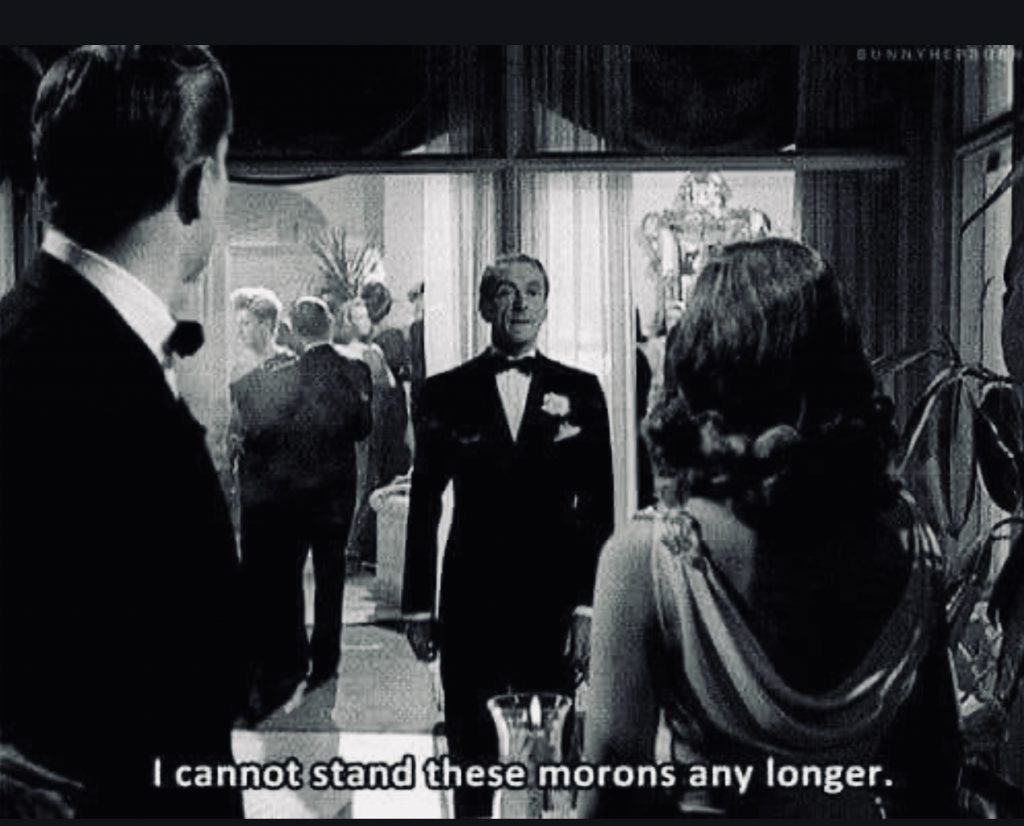
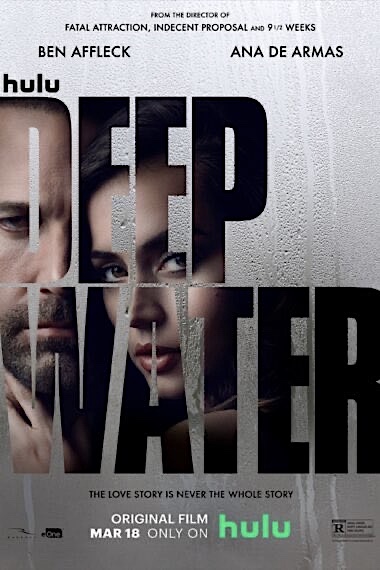
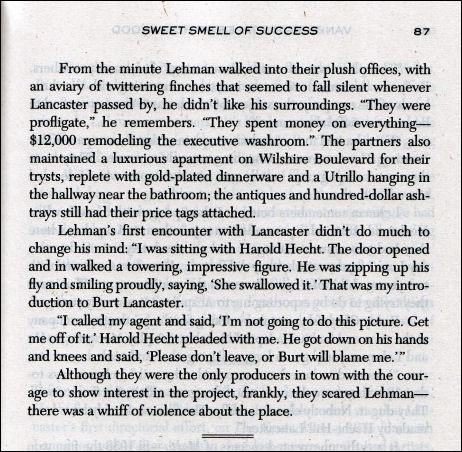
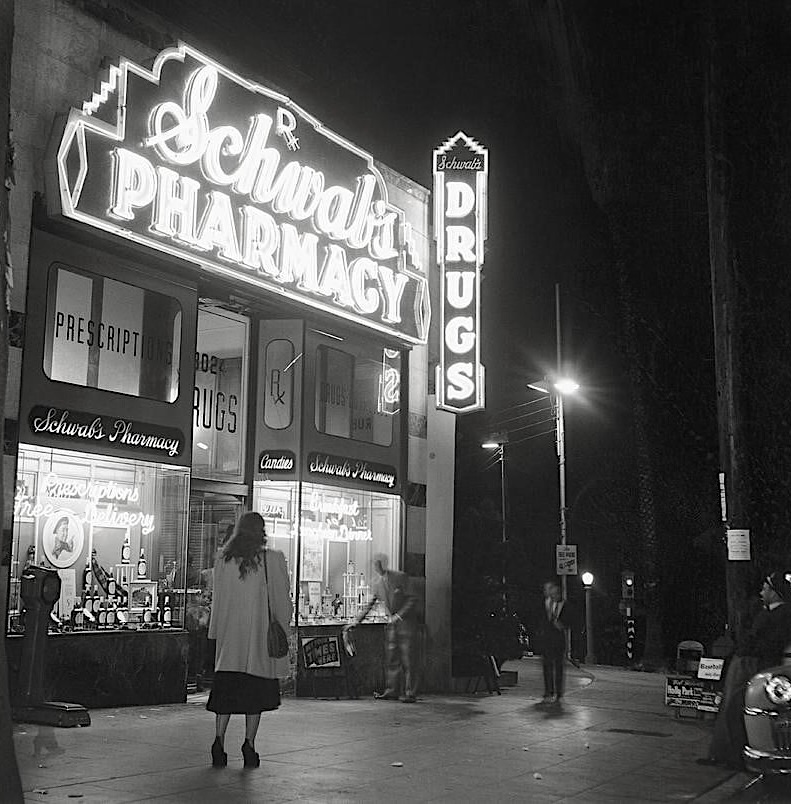
Some kind of raspberry-covered compressed pound cake with powdered sugar and tasty syrups…made my day. Here’s the general menu.

Early this afternoon I was in Le Petit Four, the longstanding Sunset Strip eatery. I was meeting with a couple of guys about a restoration of a classic ’50s film (can’t divulge specifics until next month), and about halfway through our chat Bill Maher, accompanied by a youngish Snow White-resembling brunette, walked in from the rear entrance. I caught his eye or he caught mine, and we exchanged a hint of alpha. He and Snow White sat in the inside rear area, maybe 15 or 20 feet from our table.
I’m not the hyperventilating sort who reflexively greets a celebrity if we happen to find ourselves in the same space. But I am quite the fan of Real Time with Bill Maher and yesterday I had seriously enjoyed listening to Maher’s “Sunday special” chat with The Wire‘s Ben Shapiro, and we did have a semblance of an email relationship about 20 years ago (just after Politically Incorrect was yanked over Bill’s “9/11 wackos were not cowards” line), and I was invited to fly to Las Vegas around the same time to catch his show, etc. And we did chat at a private party or two around that time.
So I felt there was an ever-so-slight basis to maybe walk over and offer a quick “yo” and duck out.
But as I was mulling this over, I was contemplating Bill’s “normcore” outfit — dark green-plaid shirt, black baseball cap, dark jeans, black athletic shoes. And I have to say that as one New Jersey guy contemplating another (Bill grew up in River Vale, and I was mostly raised in Westfield), I was vaguely….uhm, taken aback?
Anyone can wear anything they damn well please on a Sunday afternoon, of course, and it’s none of my damn business to criticize someone who happens to be in a normcore mood…please. The polite thing to do right now, I realize, is to sidestep the issue and move the fuck on. I was just a wee bit surprised, is all. I’ve always thought of Maher as an East Coast uptown guy with sartorial inclinations not that different than my own.
Anyway I decided to throw caution to the wind and walk over for a quick hello. Right away I sensed this was a bad idea. I mentioned that I’d listened to the Shapiro chat while driving home from Santa Barbara yesterday, but for some reason I couldn’t remember Shapiro’s name (weird). I was nervous and choking. I knew right away that I had erred because Bill didn’t say a word — he just gazed at me like I was a tree or a gas pump. I thought for a split second that he might be ripped or even tripping on something — his facial expression reminded me of that red-haired kid (Aaron Wolf) who was stoned during his Bar Mitzvah in Joel and Ethan Coen‘s A Serious Man. The same message was flashing over and over…”get outta there, get outta there, get outta there.”
This is why it’s better to just stay in your own corner. I guess this is a kind of follow-up to the “not talking with David O. Russell in Santa Barbara” story from a couple of nights ago.
…if you happen to be on domestic terms with an admirer of Vladimir Putin as well as one who repeats his bullshit about the Ukrainian government being run by Nazis and whatnot…well, that’s kinda like living with Madison Cawthorn.
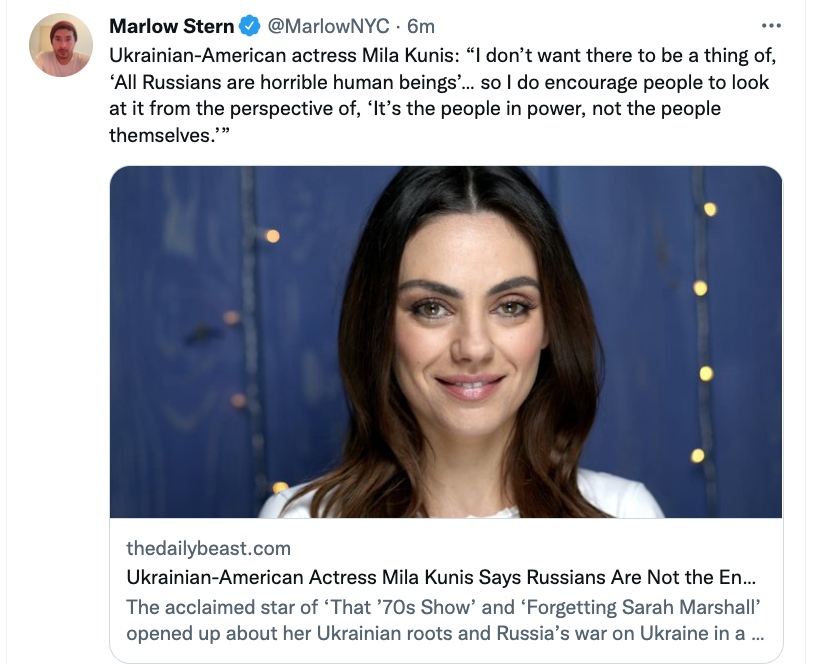

Directed and co-written by Domee Shi, Turning Red (Pixar, 2.11) is a big deal in Asian-American circles as it focuses on on Meilin “Mei” Lee, a 13-year-old Chinese-Canadian student who lives in Toronto. The basic hook is that Mei “is horrified to discover that whenever she gets too excited or stressed, she turns into a giant red panda.” But the importance of Turning Red is that it’s only the second animated film to feature an Asian lead character, the first being 2009’s Up.
In a recent Cinemablend review, Sean O’Connell wrote that Turning Red seems to have been inspired by Michael J. Fox‘s Teen Wolf (’85). He also said that Turning Red wasn’t his cup of tea. For the crime of saying this, O’Connell was villified yesterday. Asian-American Film Twitter wanted his throat cut.
Angrily disagreeing with a review is par for the course, but calling for a critic to be drawn and quartered is what Stalinist wokesterism is all about.
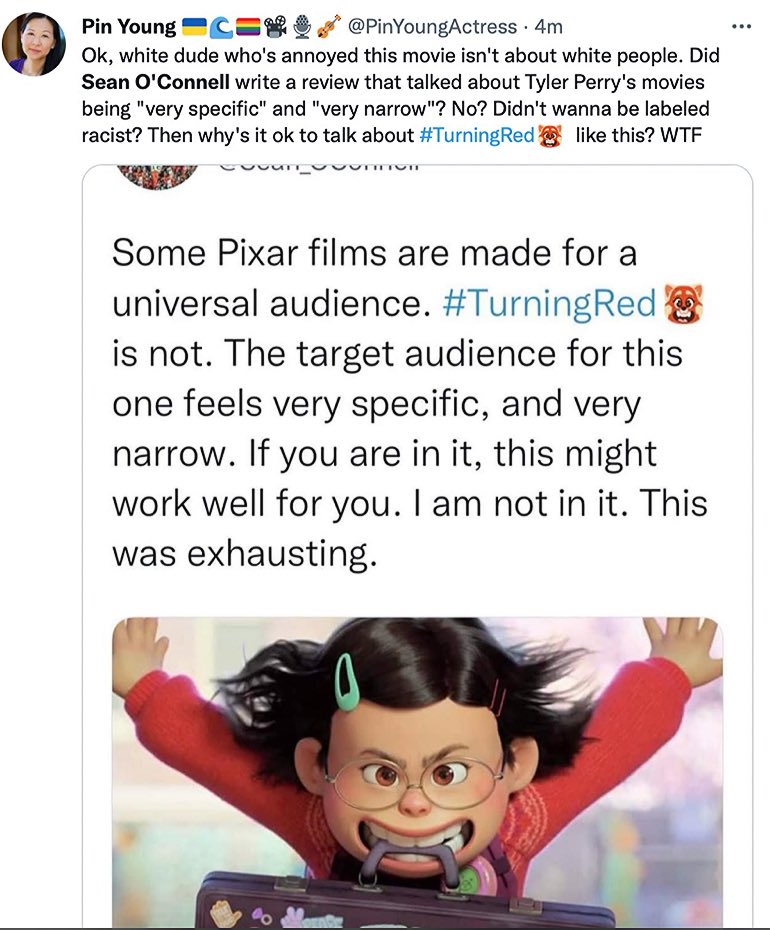
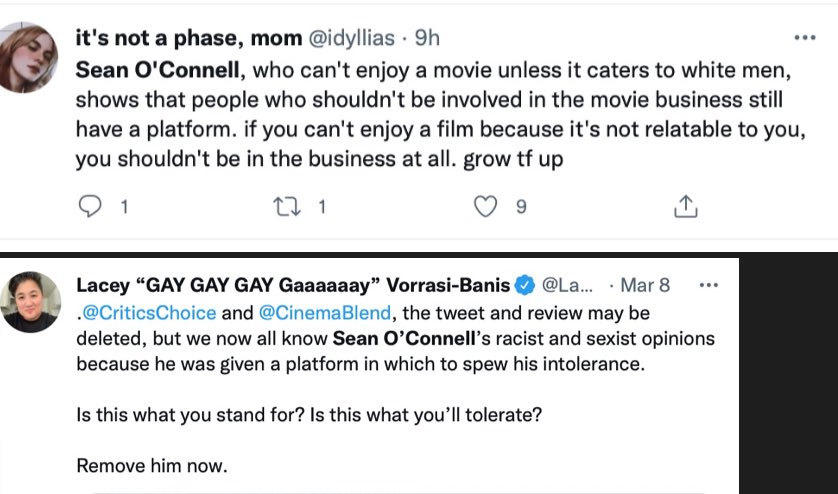
Last night Javier Bardem and Nicole Kidman, costars of Being The Ricardos. were given the Maltin Modern Master award by the Santa Barbara Int’l Film Festival. Inside the Arlington Theatre, I mean. Kidman appeared remotely due to a hamstring injury. The legendary Leonard Maltin himself handled the interviewing honors. It was a generally pleasant evening.
Neither Javier nor Nicole will win in their respective categories — Will Smith will take the Best Actor trophy, and the Best Actress Oscar will be won by either Jessica Chastain or (my fondest wish) Penelope Cruz, aka Mrs. Javier.
But I’d like to nominate or even hand an award to Javier for being the best person nominated in a major category — the kindest and warmest and most accessible fellow in the 2022 Oscar constellation.
Why? It’s all subjective but it comes down to something that happened 15 years ago in Cannes. That would be 2007 — the No Country for Old Men year. Javier and I were sitting on the the Cote d’Azur beach in the evening, and I bummed a Marlboro light from the guy, and as we parted company a few minutes later he gave me another — one to grow on, so to speak. I’ve never forgotten that moment, and that’s why I like him so much.
Update: I’m now thinking I might’ve gotten that wrong. The extra Marlboro Light episode might have happened at the Four Seasons in Beverly Hills, either in ’07 or ’08. But what’s the difference?
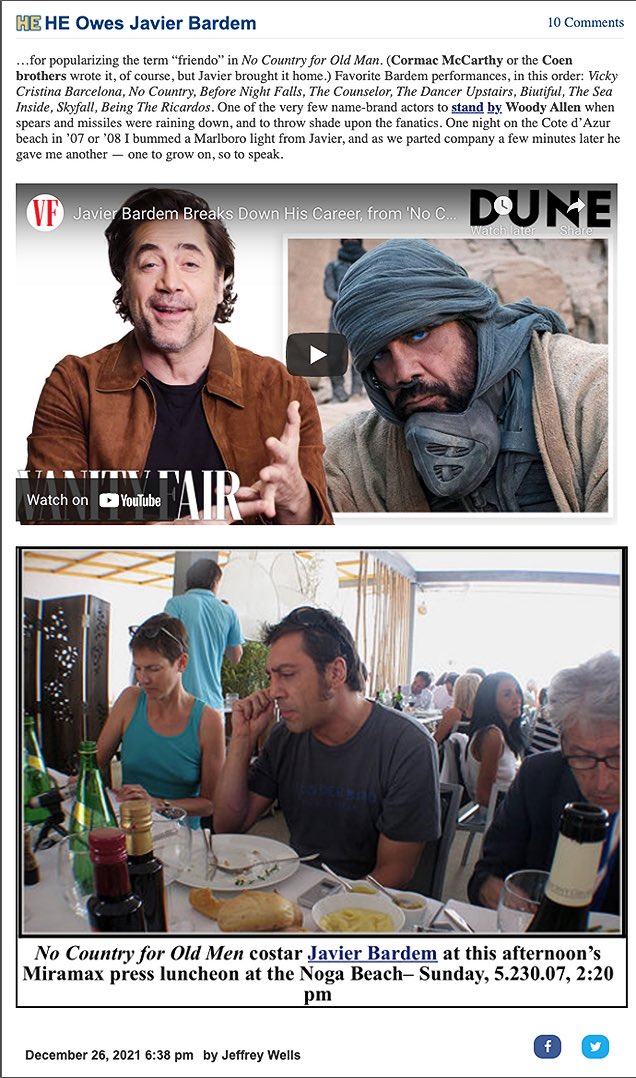
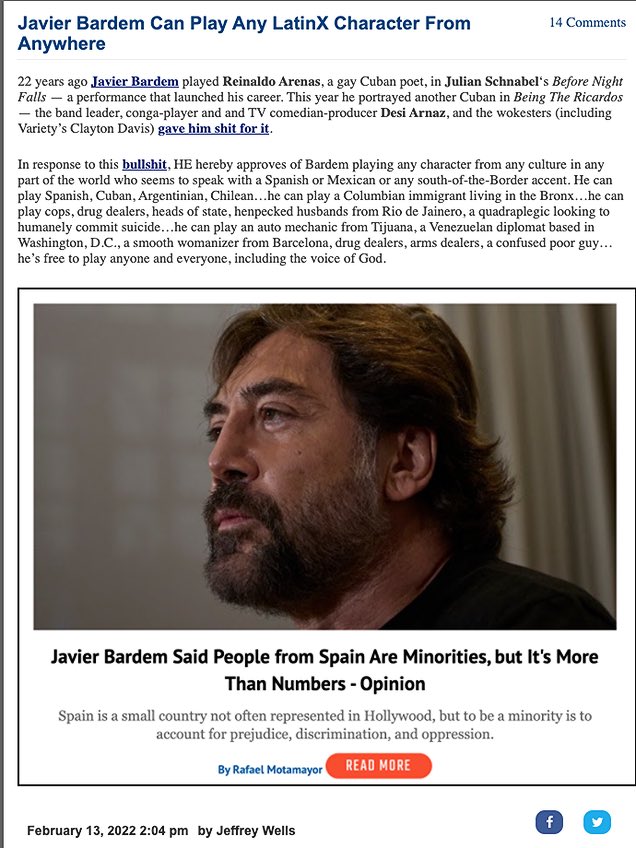
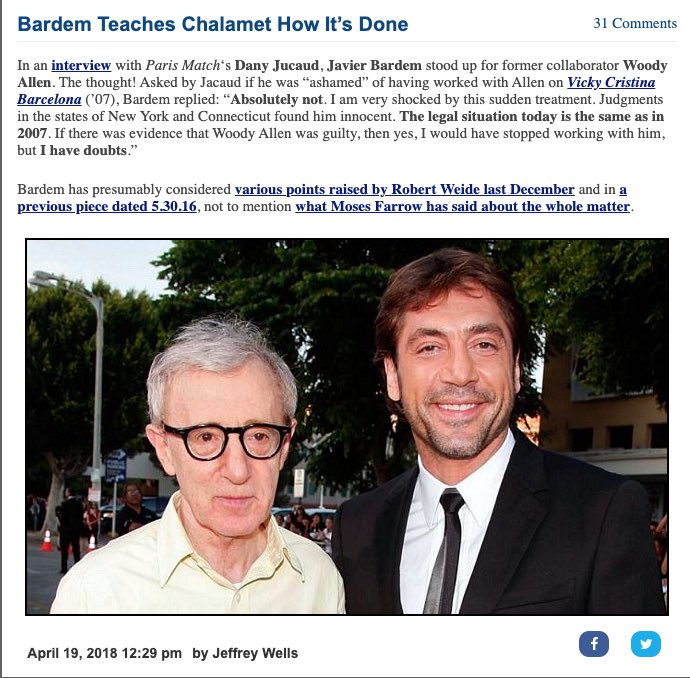
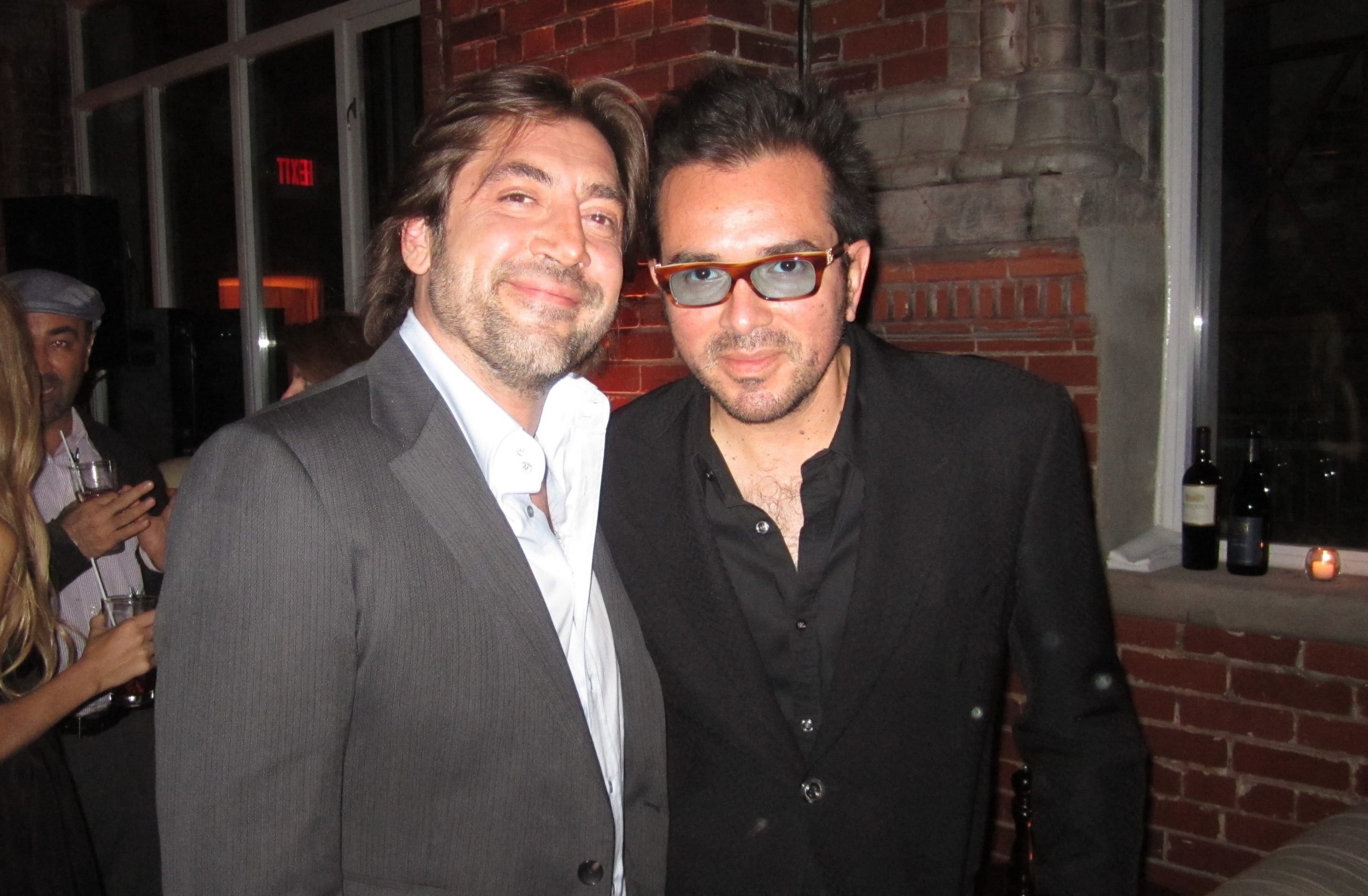
A little more than four years ago, director-screenwriter-playwright Neil LaBute was abruptly cancelled by MCC Theater, an upscale Off Broadway company that had produced and supported his controversial plays for 15 years. LaBute has worked steadily in features and TV since and is doing “fine”, but the MCC surprise seemed to signal an across-the-board dismissal of LaBute by #MeToo and #TimesUp progressives.
LaBute’s provocative plays and films (In the Company of Men, Your Friends & Neighbors, The Shape of Things, Fat Pig, Some Girl(s), Some Velvet Morning, Reasons To Be Pretty) have been derided by certain critics as misanthropic and misogynist. His speciality is dramatizing misunderstandings, woundings and acidic currents between contentious men and women in their 20s, 30s and 40s.
Anyway, it would seem (and I’m emphasizing the “s” word) that LaBute didn’t do anything specific to warrant the MCC termination. It seems, rather, that he just continued to write the same kind of stuff, and that post-2017 the woke comintern simply said “enough” and decided to get rid of him.
Last night I watched LaBute’s House of Darkness, an elevated horror film that uses (borrows?) themes and situations from Promising Young Woman and Midsommar. When and if it opens, House of Darkness, which costars Kate Bosworth and Justin Long, will probably be attacked as a metaphorical woman-hating horror film. Or a man-hating #MeToo horror film. Or something like that.
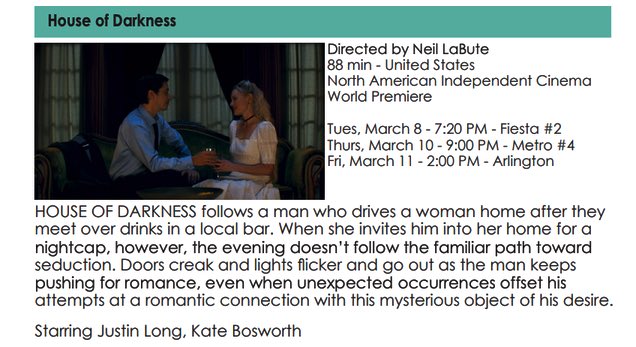
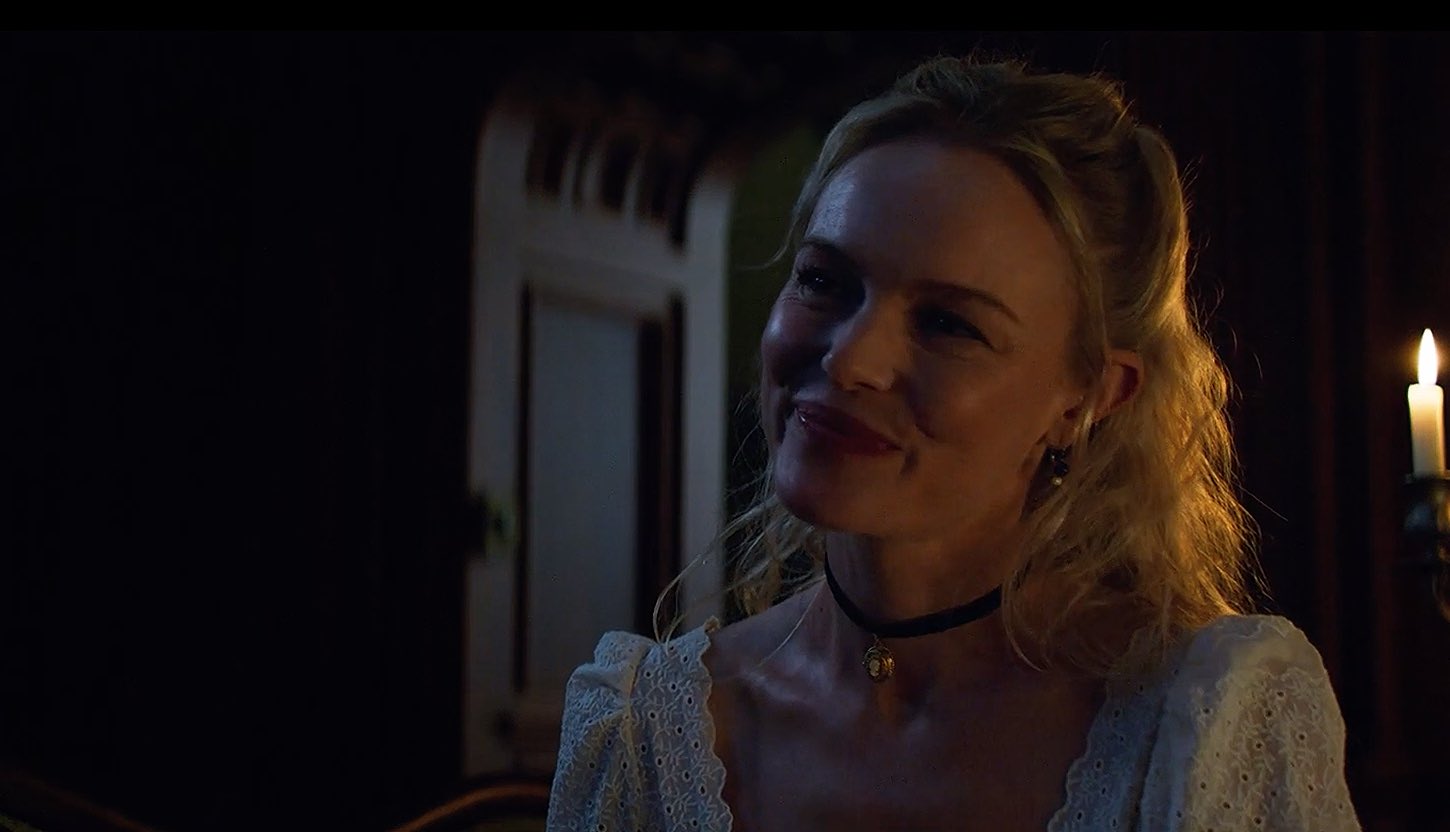
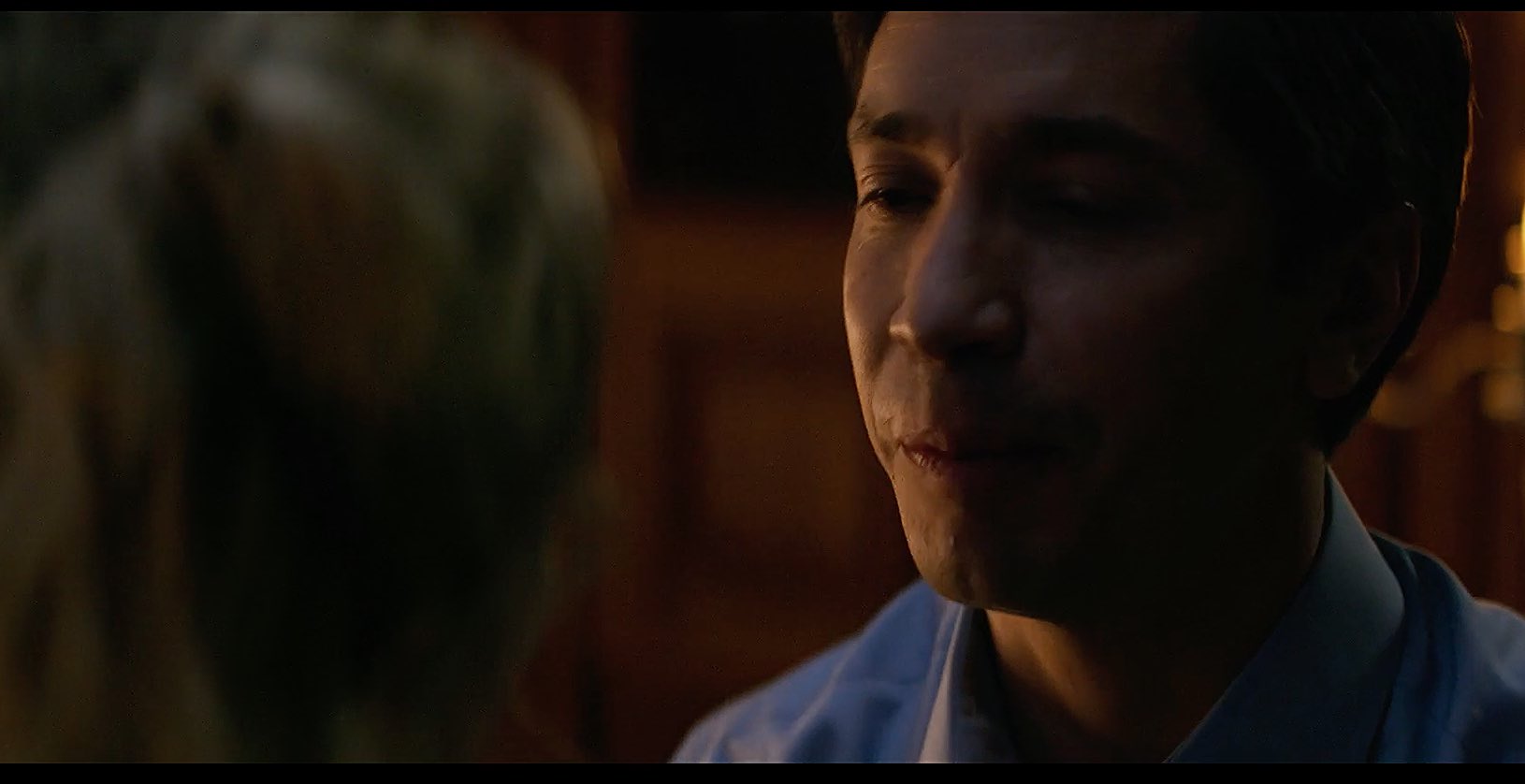
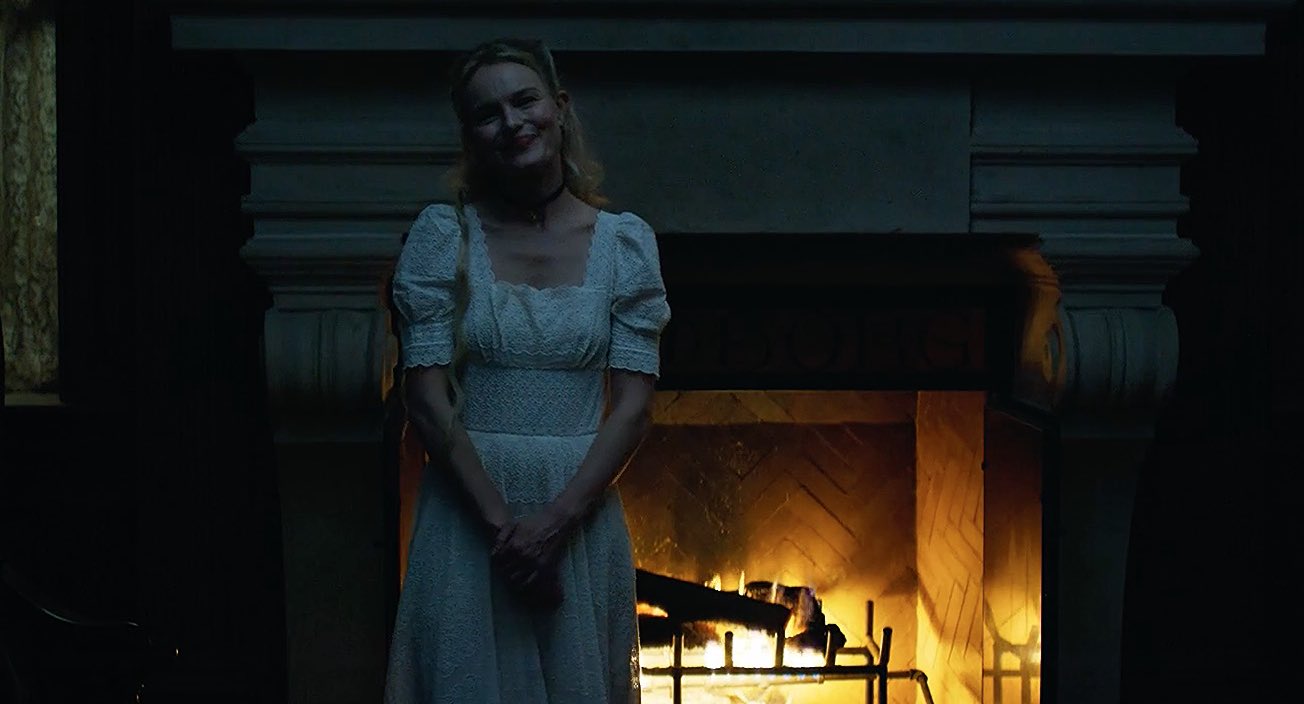
It’s definitely trafficking in social metaphor — #MeToo and #TimesUp and others in the women’s progressive movement looking to bring pain and terror to the male jerks of the world.
I don’t think House of Darkness does anything phenomenal. All it does is apply the basic LaBute attitude software to Promising Young Midsommar.
Long plays a typical Labute-ian sexist sleazeball bullshitter, and Bosworth (they’ve been actual, real-life lovers since last year) plays one of the Dracula sisters.
Bosworth and two other women play feminist avengers, and Long is a boozy, middle-aged version of Keanu Reeves‘ Jonathan Harker.
Unlike the bright and sunshine-filled Midsommar, LaBute’s film takes place in the dead of night inside a large, European-styled, castle-like abode (i.e., the real-life Dromborg Castle in Fayetteville, Arkansas). Suffice that horrible punishment happens to Long’s dipshit bad guy, whom no sensible woman would want to be within 100 yards of anyway.
The bottom line is that there’s barely a mention of LaBute’s film online. I searched around last night and it simply doesn’t exist except on IMDB Pro. No stills, no trailers, no nothin’. Very little on LaBute’s IMDB Pro page and nothing whatsoever on his Wikipedia page. No mention of the film on Long and Bosworth’s IMDB and Wikipedia pages.
It’s as if people on their respective staffs or teams went to some difficulty to erase any mention of this film. It’s almost unheard of for mentions of a completed but unreleased film to be this difficult to find.
Why guest programmer Claudia Puig chose to book this lost-at-sea film at the Santa Barbara Film Festival is anyone’s guess. Perhaps she decided to include it out of respect for LaBute’s reputation during his late ’90s-early aughts heyday?
Perhaps the producers tried to sell it and failed, not just theatrically but with streamers and cable stations….everyone shrugged. (Maybe.). I called a couple of producer’s reps today and they said they’d never heard of it.
But House of Darkness isn’t that bad. It’s creepy, diverting, socially thoughtful — altogether a half-decent sit.
It’s doubly weird that producers allowed the SBIFF to be the first-anywhere festival to show House of Darkness. And without a word of fanfare. They knew, of course, that people like me would see it and write about it, etc.

Sam Loomis (John Gavin) and the Pheonix-residing Crane sisters (Janet Leigh‘s Marion and Vera Miles‘ Lila) were, of course, never in the same room together. But once you get past this and after you contemplate the fact that Lila has her palm pressed against Sam’s rib cage, you immediately consider the possibilities.
Could straight-arrow Sam have been two-timing Marion with a concurrent affair with Lila? No — that would have been too much, too reckless, too thoughtless for a financially pressed owner of a hardware store.
But after Norman Bates was arrested for the murder of Marion and Martin Balsam‘s Arbogast and the whole thing had been put to bed, could Sam and Lila have gradually become lovers? As a way of embracing life and renouncing death? This, to me, seems conceivable.
I always assumed that Peter Bogdanovich falling in love with and marrying Louise Stratten, the younger sister of his murdered lover Dorothy Stratten…I always thought he was motivated by the same spirit of renunciation and renewal — an attempt to replace the trauma of murder with the bloom of fresh love.

This recent trailer for Adrien Lyne‘s Deep Water (Hulu, 3.18) gives you a taste of the territorial rage and icy cruelty in Patricia Highsmith’s source novel, which was published 65 years ago. Lyne’s film, which costars Ben Affleck and Ana de Armas, began shooting in November 2019. One viewing tells you that a certain stubble-faced party is going to dispose of other parties, at the very least.
Hollywood Elsewhere will be gladly returning to the Santa Barbara Film Festival next week. I’ll remain there for eight or nine days. The SBIFF is the friendliest, sexiest, easiest-to-navigate major film festival in the entire civilized world. Start to finish, it feels a sea breeze. And with the new CDC ruling we might not have to wear masks all the time!
The Directors of the Year Award tribute on Thursday, March 3rd (Spielberg, Anderson, Branagh, Campion, Hamaguchi) is the kickoff event.
On Friday night Spencer‘s Kristen Stewart will sit for a longish, in-depth interview at the Arlington while receiving the Riviera Award.
The next day brings the dual Writers and Producers Panels on Saturday, 3.5.22. The writers will include Kenneth Branagh, Jane Campion, Zach Baylin (King Richard), Maggie Gyllenhaal (The Lost Daughter), Sian Heder (CODA), Adam McKay (Don’t Look Up), Denis Villeneuve (Dune) and Eskil Vogt (The Worst Person in the World), and will be tossed the usual softball questions by IndieWire’s Anne Thompson.
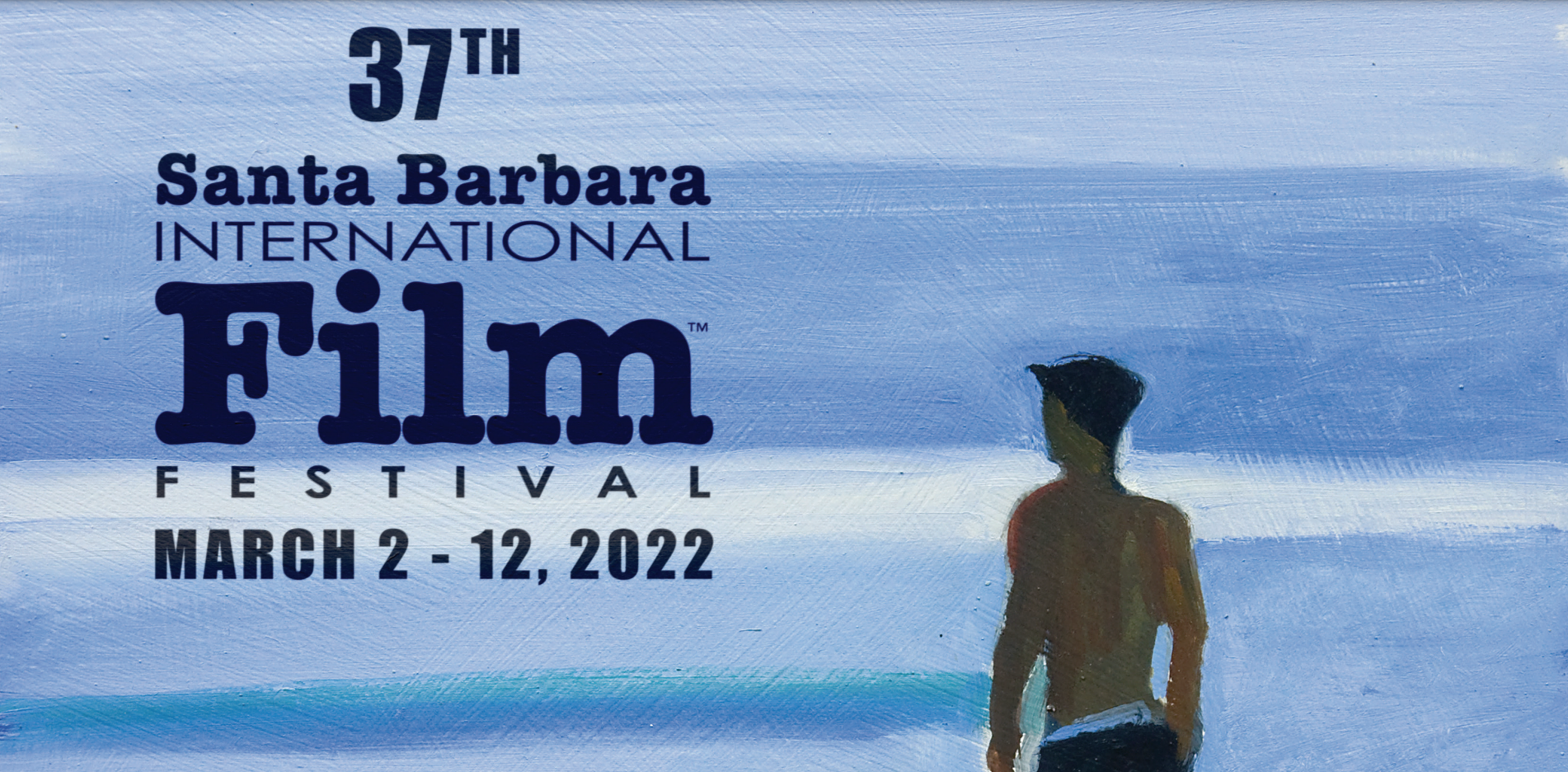
The Producers Panel, set for the afternoon of March 5 and moderated by the mild-mannered Glenn Whipp will include Laura Berwick (Belfast), Miles Dale (Nightmare Alley), Kevin Messick (Don’t Look Up), Rita Moreno (West Side Story), Sara Murphy (Licorice Pizza), Mary Parent (Dune), Tanya Seghatchian (The Power of the Dog), Patrick Wachsberger (CODA), Tim White (King Richard) and Teruhisa Yamamoto (Drive My Car).
The SBIFF Virtuosos Award ceremony will happen at the Arlington that evening (Saturday 3.5) with TCM’s Dave Karger moderating. Belfast‘s Ciaran Hinds, Caitriona Balfe and Jamie Dornan, plus Ariana DeBose (West Side Story), Alana Haim (Licorice Pizza), Emilia Jones (CODA), Troy Kotsur (CODA), Simon Rex (Red Rocket) and Saniyya Sidney (King Richard).
The following morning (Sunday, March 6) will launch the Animation Panel, with SBIFF executive director Roger Durling moderating.
Not to mention King Richard‘s Will Smith and Aunjanue Ellis receiving the Outstanding Performers of the Year Award in a ceremony that begins at 8 pm on Sunday, 3.6 at the Arlington theatre, (b) Penelope Cruz receiving the Montecito Award on Tuesday, 3.8 at the Arlington, (c) Benedict Cumberbatch receiving the Cinema Vanguard award on Wednesday, 3.9 at the Arlington, (d) Javier Bardem and Nicole Kidman receiving the Maltin Modern Master Award on Thursday, 3.10 at the Arlington, and (e) a ten-year anniversary screening of David O. Russell‘s Silver Lining Playbook with a Russell q & a to follow.
The SBIFF runs from March 2nd through 12th.
Madonna looks great for a 63 year-old. She looks great for a 33 year-old. Having been there and done that in my home town of Prague, I’m all for good tasteful “work”. But most of us would agree, I think, that it’s important to resemble the person you were 15 or 20 years ago. I’d better watch my step — this is the same kind of observation that Owen Gleiberman shared about Rene Zellweger five years ago.



…if a semblance of All In The Family could return as a present-tense social-issues Hulu series, except Archie could be…well, a bit like myself…sensible liberal older guy, perhaps an editor & founder of an online publication or web business of some kind, grappling with the pressures of HR woke terror in the workplace, clashing with Millennial or Zoomer daughter and BIPOC son-in-law who are living with him while they save for a house…basically Hollywood Elsewhere meets Norman Lear…except Archie Wells wouldn’t be as smug or under-educated as Carroll O’Connor was…it could write itself.